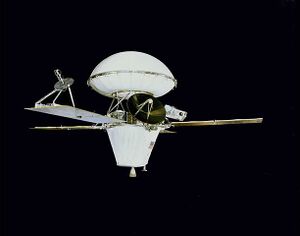Viking 2 (nonfiction)
The Viking 2 mission was part of the American Viking program to Mars, and consisted of an orbiter and a lander essentially identical to that of the Viking 1 mission.
Description
Viking 2 launched on September 9, 1975 at at 18:39 using a Titan/Centaur launch vehicle.
Following a 333-day cruise to Mars, the Viking 2 Orbiter began returning global images of Mars prior to orbit insertion.
The orbiter was inserted into a 1500 x 33,000 km, 24.6 h Mars orbit on August 7, 1976.
The orbit was trimmed to a 27.3 h site certification orbit with a periapsis of 1499 km and an inclination of 55.2 degrees on 9 August.
Imaging of candidate sites was begun and the landing site was selected based on these pictures and the images returned by the Viking 1 Orbiter.
The lander separated from the orbiter on September 3, 1976 at 22:37:50 UT and landed at Utopia Planitia. Normal operations called for the structure connecting the orbiter and lander (the bioshield) to be ejected after separation, but because of problems with the separation the bioshield was left attached to the orbiter.
The orbit inclination was raised to 75 degrees on 30 September 1976.
The orbiter primary mission ended at the beginning of solar conjunction on October 5, 1976. The extended mission commenced on 14 December 1976 after solar conjunction.
On 20 December 1976 the periapsis was lowered to 778 km and the inclination raised to 80 degrees.
Operations included close approaches to Deimos in October 1977 and the periapsis was lowered to 300 km and the period changed to 24 hours on 23 October 1977.
The orbiter developed a leak in its propulsion system that vented its attitude control gas. It was placed in a 302 × 33,176 km orbit and turned off on 25 July 1978 after returning almost 16,000 images in about 700–706 orbits around Mars.
The Viking 2 lander operated on the surface for 1316 days, or 1281 sols, and was turned off on April 11, 1980 when its batteries failed.
In the News
Fiction cross-reference
Nonfiction cross-reference
External links:
- Viking 2 @ Wikipedia
Attribution:
